If you are sure that your rights are being violated by the insurance company in a bankruptcy case, you do not need to tolerate this. It doesn't matter whether you are a creditor or a bankrupt. Each person or legal entity in the cases under consideration retains rights, the violation of which is unacceptable. As soon as such violations have been recorded, it is important to immediately file a complaint against the arbitration manager in an attempt to resolve the problematic issue.
The AU, despite its key role at some stages of bankruptcy, is only an employee who does not have the right to self-government. Naturally, his actions may cause disagreement on the part of the participants in the case, but this dissatisfaction is not always based on objective grounds. Let's figure out when it is necessary to write a complaint, and when appealing the actions of the arbitration manager is useless.
The role of the arbitration manager
There are several participants in bankruptcy cases:
- Bankruptcy creditors;
- Debtor;
- People whom the debtor caused harm: their health, financial condition, etc.;
- Arbitration manager.
The main task of this specialist is to monitor the bankruptcy process. The AU works at different stages of the bankruptcy process, but at each stage it has its own tasks, supported by different powers. There are three types of arbitration managers:
- Temporary;
- External;
- Competitive.
But in any case, the manager takes upon himself most of the financial issues related to the debtor’s property. It can also liquidate previously conducted transactions with this property. The work of the AU is controlled by the judiciary, and its task is to satisfy the demands of creditors as much as possible or, if the debtors’ problems are not so serious, to improve their financial situation. In this case, the manager can work alone or collaborate with the head of the legal entity.
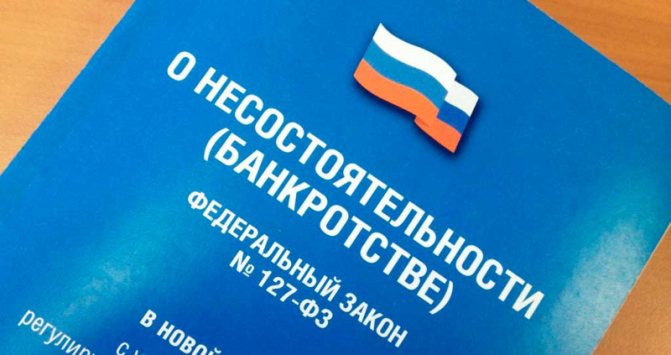
Manager functions
At different stages of the procedure for declaring a debtor insolvent, the administrator performs specific duties outlined by Law No. 127-FZ. The main purpose of the authorized person is to analyze and control the financial position of the enterprise, ensuring the maximum possible fulfillment of the claims of creditors.
The manager is authorized to:
- Organize a collegial meeting of creditors.
- Prepare written requests to the arbitration court (petition, appeal, application, etc.).
- Hire third parties to carry out bankruptcy measures with payment for services provided at the expense of the defendant.
- Receive unhindered access to a set of information about the financial and economic activities of the company, and submit requests to the bank.
- Initiate suspension from fulfillment of obligations in this case.
Persons engaged by the manager to assist in the fulfillment of obligations must have appropriate accreditation. The deadline for providing information by counterparties, regulatory authorities, and citizens interacting with a bankrupt organization is a week. Information is provided free of charge.
Let us define the main responsibilities of the arbitration manager:
- ensuring the integrity of the debtor’s property, conducting an inventory;
- detailed diagnostics of entrepreneurial activity;
- manage the creation and maintenance of a register of claims, providing it at the request of the participants in the case;
- report to the competent authority about identified administrative violations;
- organize informing creditors about contracts and transactions in which civil liability of third parties arises;
- spend funds exclusively for their intended purpose;
- identify artificially created factors that influenced the decline in the company’s payment function, and report this to arbitration, etc.
An arbitration manager replaces the management of an enterprise that has declared bankruptcy
Actions of the manager for appeal
Before filing a complaint against the actions of the arbitration manager, it is important to make sure that they really have the necessary grounds. After all, this specialist has a wide range of responsibilities and powers, and there are not many restrictions. There is no other way, because otherwise bankruptcy issues will take too long to resolve. But this does not mean that managers can afford negligence or even crimes. They are also subject to certain restrictions.
If there are no boundaries, this will entail a violation of the interests of the participants or unjustified expenses. When these violations are proven, the manager may be punished and compensate for losses. Moreover, such issues are regulated by Federal Law No. 127 “On Insolvency”.
When a complaint is made against the actions of the bankruptcy trustee, it is stated too vaguely. The law only addresses certain possible violations. For example:
- If the rights and interests of persons participating in the process are not respected (the manager works in his personal interests or the interests of other persons);
- If the obligations described in Articles 20 and 129 of the said law are not observed;
- If the deadlines and forms for submitting reports described in Articles 26 and 143 are violated;
- Failure to comply with a program designed specifically for the sale of property described in Article 130.
The Supreme Arbitration Court of the Russian Federation divided all types of offenses into two main categories:

- Ignoring direct responsibilities.
- Failure to comply with work regulations and government instructions.
In addition, the responsibilities of SRO managers are being withdrawn.
Violations for suspension
As mentioned above, a variety of violations can be attributed to arbitration managers. But these violations are not always serious enough to warrant filing a complaint. That is why we will highlight only those issues that are suppressed by the court - if not forever, then for a long time. So, among the most serious violations are the following:
- Direct responsibilities are not fulfilled. For example, the arbitration manager fails to act in terms of holding meetings of creditors or does not submit opinions on the work performed. These are his immediate responsibilities, failure to fulfill which indicates his professional incompetence;
- There are omissions in the conduct of creditor meetings, which should be held with a certain regularity. This is necessary to keep creditors who are interested in receiving financial compensation in the loop;
- There is a reason to hold an urgent meeting of creditors, but the manager ignores this reason;
- Bankruptcy proceedings were carried out, but reports on them were not presented to the courts;
- AU deliberately delays the procedure, but this is not necessary. In the end, everyone suffers losses;
- The assessment results are hidden from creditors. This behavior of the AC arouses suspicion and suggests the illegality of the operation;
- The creditor does not approve the price of the property for bankruptcy proceedings or make an effort to bring the property to a sale to satisfy debts.

You can start a procedure to appeal against the manager’s inaction or illegal actions if direct violations have been observed. The criterion by which it can be determined that a violation actually occurred is financial losses. If none were observed, it doesn’t matter either. Even the possibility of such losses may serve as a sufficient basis. In addition, the consistency of bankruptcy proceedings at the meeting plays an important role. Participants in the case must always be aware of what is happening. Also, reports on the procedure must be submitted to the NFRSB.
Acceptable ambiguous actions
The trustee does not work on bankruptcy cases independently. According to the law, he can hire and use the services of all specialists whose help he seems necessary. Moreover, he does this not at his own expense, but at the expense of the debtor and, indirectly, the creditors. They may not have enough money after bankruptcy proceedings, since payment for the services of all these professionals is carried out from the bankruptcy estate. That is why it is important to control the appetites of an overly trying manager.
In addition, the manager can perform actions that are considered controversial, but at the same time are not prohibited by the court:
- Conclude lease agreements for the debtor’s real estate on his behalf;
- Involve other specialists in the work (here we mean the help of lawyers);
- Refuse certain creditors to present certain debtor documents or case documentation;
- Contest (bankruptcy trustee) the debtor's transactions (for example, actions for the sale of real estate and other valuable property).
Typically, a complaint against a financial manager will be considered unfounded if he acted in accordance with the instructions agreed upon at the meeting of creditors. According to court rules, it is the meeting of creditors that is the main regulatory body. It’s another matter if this meeting was not held or, due to the fault of the manager, not all creditors were included in the queue.
Results
The candidacy of the manager is appointed by the court in order to ensure compliance with the norms of current legislation and protect the interests of participants in the trial. A complaint against the actions of an arbitration manager is an opportunity to challenge the decision of the parties to the case, a guarantee of respect for rights and ensuring the conscientious fulfillment of obligations by the person involved.
In addition, complaints will be discussed in the video:
Attention! Due to recent changes in legislation, the legal information in this article may be out of date!
Our lawyer can advise you free of charge - write your question in the form below:
Free consultation with a lawyer
Request a call back
Participants in insolvency proceedings are sometimes forced to defend their rights, especially when legal norms are violated. These specialists are obliged to act in the interests of the persons involved in the bankruptcy case. The performance of their duties is controlled by the state.
When the executive body works in its own interests, it is quite difficult to prove violations. In addition, not everyone knows where to complain about. It is important to understand in what cases a complaint is filed against a bankruptcy trustee with the Arbitration Court and what forms of appealing his actions exist.
Where to file a complaint
The next pressing question: where to complain about the bankruptcy trustee in bankruptcy? If you decide to complain about the AC, you can contact the following organizations:

- Arbitration court. The first instance where a complaint is filed is the arbitration court. You can submit a document here, since it is this body that must control the activities of the appointed AU. According to the law, participants in the case can complain, while complying with the requirements for claims of the Arbitration Procedure Code of the Russian Federation. In addition, in court you need to justify your opinion and provide evidence. Not all complaints of the injured parties are satisfied in court. To fully satisfy the requirements for appealing the actions of managers, it is advisable to hire professional lawyers. They will help you draw up documents correctly or dissuade you from starting a deliberately losing business.
- Another option is a complaint to Rosreestr. The third part of Article 14.13 of the Code of Administrative Offenses of the Russian Federation states that violations or inaction of the administrative authority entail administrative liability (if this is not a crime for which criminal liability already arises). But in order for the case to be considered as quickly as possible, a complaint against the manager must be sent to the territorial office of Rosreestr. If you send it to the central one (in Moscow), the case will either not be considered, or it will take longer than necessary.
- SRO. For example, a sample document is submitted to self-regulatory organizations (SROs) if the AU does not fulfill its professional duties. This body monitors the work of its own employees, since all independent companies can legally work only after they are included in the SRO. If a complaint is received against a specialist by the SRO, it is considered by a commission specially created for this purpose - the disciplinary committee.
- Federal Tax Service. This is the authorized body dealing with bankruptcy cases. You can complain here when the bankruptcy trustee harms creditors or the debtor (for example, if he took over a bankrupt enterprise).
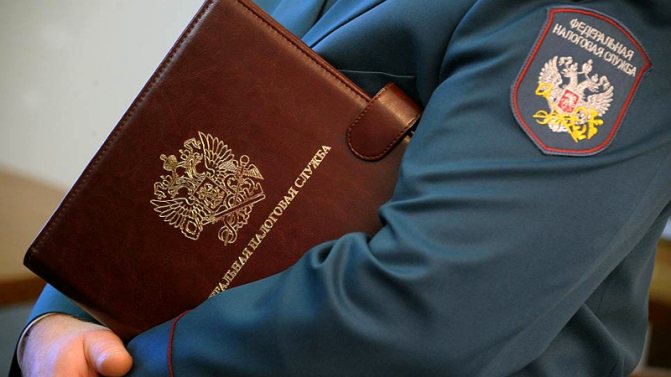
In addition to the listed government bodies, there are other organizations where you can complain about a dishonest AU. For example, a complaint against the bankruptcy trustee is filed with the prosecutor's office, the Ministry of Finance or the Ministry of Internal Affairs. In order for a complaint to be considered, it must be taken into account that each organization minds its own business. If you send a document to an authority whose competence does not involve working with financial crimes, the culprit will not be properly punished.
Who can file a complaint against the bankruptcy trustee?
All participants in the case of declaring the insolvency of the company can file an application for the inaction of the bankruptcy trustee or for his actions that entailed negative consequences. These include:
- creditors;
- debtor;
- representative of employees of a legal entity;
- representative of the founders of a legal entity;
- representative of the owner of the property of a legal entity;
- authorized bodies.
People who are indirectly involved in the case and who have suffered from the actions of a specialist cannot complain on a general basis.
The SRO is not among those directly involved in the bankruptcy case. However, it has the right to petition for the removal of its employees from participation in the paperwork if illegal actions are detected. This is due to the fact that, according to Article 35 of the federal law “On Bankruptcy”, the SRO is a participant in the process of declaring the insolvency of a company. The legislative bodies did not regulate this point in any way and left this list of participants in this process open. To date, no changes have been made to this paragraph.
Where to file a complaint against the arbitration manager
You can complain about the arbitration manager at:
- Arbitration court. Quite often this authority is the first to be contacted. In accordance with the law, only participants in the process can write a complaint. In this case, it is necessary to comply with all the requirements for written claims of the Arbitration Procedural Code of the Russian Federation. In court, you must substantiate your statements and provide evidence. The arbitration court does not satisfy all complaints received from injured parties. To draw up a competent claim in court, it is recommended to seek help from professional lawyers who will help you prepare the documentation correctly.
- Rosreestr. The Code of Administrative Offenses of the Russian Federation in the 3rd part of Article 14.13 states that violations or inaction of the bankruptcy trustee entail administrative liability. This refers to offenses that do not fall under criminal liability. For a faster consideration of the complaint, it is recommended to contact the territorial office of Rosreestr. Sending documents to the central office located in Moscow can result in claims taking a very long time to be processed or not being reviewed at all.
- A self-regulatory organization in which the specialist is a member. This body should be contacted when an employee does not fulfill his professional duties. All CGs are members of similar organizations, which are obliged to carefully monitor the quality of work of their employees. When claims against an arbitration specialist are received by such an organization, they are considered by an internal special commission - a disciplinary committee. As a result of the meeting, the employee may be fined or suspended from work for a certain period.
- The Federal Tax Service. This government body helps solve problems related to violations in the bankruptcy procedure, and also deals with serious criminal cases: fictitious bankruptcy, an attempt by an entity to circumvent the law.
You can also send written complaints against an unscrupulous utility company to other organizations: the prosecutor's office, the Ministry of Finance or the Ministry of Internal Affairs.
Contents of the complaint. Methods of its presentation
A written complaint is a very significant document, the writing of which requires certain knowledge. Current statistics report that only every fifth complaint form against the activities of the CG is considered by the judge as a significant claim. All the rest fall into the category of unfounded statements that are aimed at unsubstantiatedly fraying the employee’s nerves.
When drafting a document, you should keep business language in mind. You need to write in an official style without indicating unnecessary details, but do not miss the main points. You should also refrain from threats and insults, regardless of the damage caused by the actions of the arbitration manager.
Filing claims in writing against the bankruptcy trustee is regulated by Article No. 60 of Federal Law No. 127-F3 and Article No. 131 of the Civil Procedure Code of the Russian Federation. The document must indicate exact data, address and name of the department to which it is sent. It is worth remembering that the complaint must be drawn up as follows: a detailed description of the violation, indisputable evidence, demands for punishment. Without substantial evidence there is no complaint.
The text of this written request must include the following information:
- Full name of the applicant.
- Postal address and contact telephone number of the applicant.
- Full name of the arbitration manager.
- The name of the SRO of which the manager is a member.
- A description of all actions (inactions) of the specialist that led to the preparation of the document.
- Requirements.
- Date of document creation.
- List of documents that are attached to the complaint.
There are also special requirements for the structure of the document. It should have the following structure.
- Introduction. This part indicates the data of the participants in the process, the authority where it is filed, the details of the court, and the number of the bankruptcy case. The complaint must be filed within the established statute of limitations before the bankruptcy proceedings end. The arbitration court considers written requests only during the period when the bankruptcy decision is pending.
- Main part. It describes the essence of the case, the specific actions or inactions of the specialist, and lists the violations with references to articles of the law.
- Resolution part. This indicates the demands put forward by the injured party. They must correspond to the powers of the authority to which the document is sent. One of the first points should be the requirement to recognize the manager’s actions as illegal and contrary to established norms. It also specifies the measures that must be taken against the employee.
An employee who has received complaints may exercise his right to appeal them. To ensure that an unscrupulous manager cannot avoid responsibility, we recommend that you take the collection of documents and writing a complaint seriously.
To file a complaint, you can use any convenient method:
- personally. This is the most secure way to apply. The advantage of this method is the presence of a mark indicating that the application has been accepted for consideration. Also, when accepting a complaint, employees will point out errors in the document that can be corrected on the spot. The disadvantages of this method include the fact that all participants in the financial insolvency case must receive a copy of the received complaint, otherwise the court will refuse to accept the application for consideration.
- By registered mail via Russian Post. It is reasonable to use this method if the department to which the complaint is sent is located in another city. It also has a number of disadvantages: lengthy delivery of mail, the need to stand in line at the post office, the inability to make changes to the sent document;
- Express delivery. Unlike mail, delivery times will be noticeably reduced, but the cost of the shipment will increase.
- Through an electronic service, if its use is provided for by the department. You can file a complaint with the Arbitration Court against the actions of the bankruptcy trustee using the “My Arbitrator” online service. You can submit an electronic complaint to Rosreestr, the Federal Tax Service and the prosecutor's office. When using this method, you must follow all the rules for filling out the provided forms, which are established by services for remotely sending documents.
The procedure and time frame for considering complaints against the bankruptcy trustee. How to withdraw a complaint
After the violation has become known, 30 days are allotted for drawing up and sending documents. But the law provides for cases when this time can be adjusted. For example, in the case when documents were sent by mistake to the wrong body, whose competence includes resolving such issues.
In each individual case, the consideration of complaints against the actions of the arbitration manager is determined by the body and official who will consider the received documents.
Upon receipt by the relevant department, if no serious errors or omissions were made when drawing up the complaint that could cause the document to be returned, the application is registered and processed for further consideration. 10 days are allotted for this. In the case of Rosreestr, this period is five days.
The Bankruptcy Law establishes a clear time frame for the consideration of incoming complaints about illegal actions of the anti-crisis manager - 30 days. During this time, the judge must review the materials and schedule a hearing on the case. All parties to the company's insolvency proceedings have the right to familiarize themselves with the text of the complaint and the case materials. They can also raise objections, provide evidence, and take an active part in resolving the complaint.
The result of consideration of the received application is the admission of guilt by the bankruptcy trustee or the establishment of the status of the complaint as unfounded. In any case, the decision can be appealed to a higher authority.
Before the official adoption of a judicial act on the termination of the case, the person filing the complaint has the right to withdraw his written complaints about the work of the competition manager. To do this, a request must be sent to the Arbitration Court, and only after that the claim will be withdrawn. The withdrawal of claims should not contradict the law, nor violate the rights and interests of other participants in the process.
Contents of the complaint
This is a procedural document drawn up in writing. The document must provide accurate information to determine who is the applicant and who will have to respond. In addition, you must indicate to which body the complaint is being sent.

But in terms of its structure, the document must meet certain requirements. The most important thing is to adhere to a certain structure. So, the document must consist of several mandatory points:
- Introductory part. In this part of the document you need to enter where it is being submitted, set the details of the court and the participants in the process. Do not forget to indicate specific names, full names and addresses (including the city). The bankruptcy case number is also indicated, otherwise the court will not be able to find out what the claim is about.
- Descriptive, or, as it is called, basic. It needs to reveal what exactly the problem is that caused so much negativity. It is necessary to describe the actions or inactions of the AC that aroused suspicion. But statements should not be unfounded. Each claim must be supported by articles from the law.
- Demanding (the second name of this part of the document is operative). In this part, the injured party must indicate what exactly it requires, taking into account the powers of the body to which this document is submitted. For example, you can demand to cancel some action of a specialist or exclude him from the process.
You can understand what a document should look like using a sample.
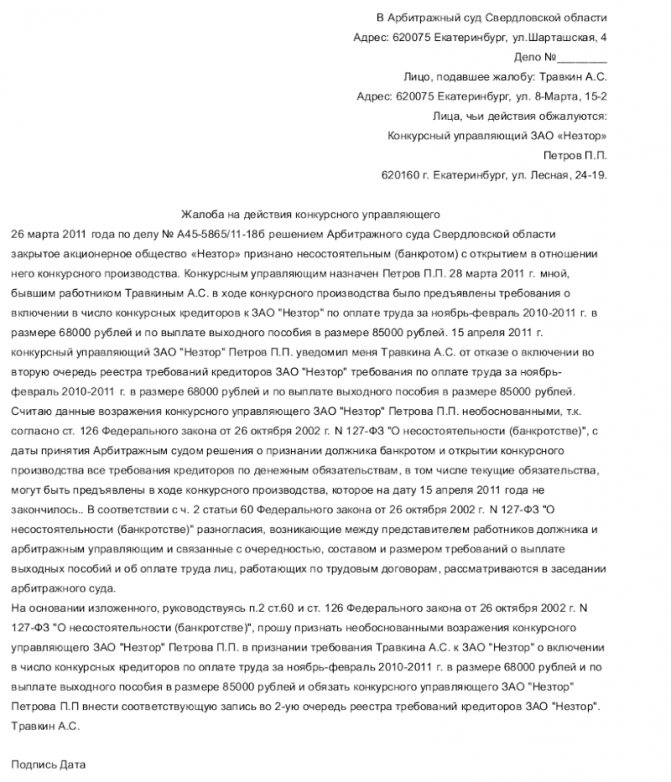
Methods of appeal
The legislation of the Russian Federation provides for several ways to resolve the issue of illegality of actions of an arbitration specialist. You can appeal the action or inaction of the bankruptcy trustee by filing a petition with the following structures:
- Arbitration court;
- self-regulatory organization of managers;
- Rosreestr authorities;
- Federal Tax Service of Russia and other authorities.
Complaints about unlawful actions require serious preparation for the legal process, since they are classified as complex. This is due to the fact that when considering them, not only legislative norms are taken into account, but also judicial practice with the possibility of proving certain violations.
Legal support when appealing the decisions of the manager is provided in the form of consultations - the correct form of drawing up and preparing a complaint about improper performance of duties by a specialist, legal support for its consideration in court. In addition, specialized companies offer legal support for procedures such as changing SROs and removing a manager from performing duties.
According to Part 3 of Art. 14.13 of the Code of Administrative Offenses of the Russian Federation, failure to fulfill the obligations established by the bankruptcy law entails administrative liability - this is disqualification and other forms, if the action or inaction of a specialist is not a criminal offense. To attract arbitration managers to her, they contact Rosreestr. Prosecution by contacting this structure takes place in court, so consideration of the application may be delayed. In this regard, it is recommended to send the document to the territorial office.
As a rule, Rosreestr considers applications from government agencies and creditor meetings. In other cases, a complaint about the actions of the bankruptcy trustee is forwarded to the SRO, where the application is considered by a specially organized disciplinary committee.
Deadlines
Complaints against the AU are sent within 30 days from the moment the problem is identified (for example, the deadline for action by the bankruptcy authority has passed, and the report has not been submitted). But the law provides for several cases when the time frame can be shifted. For example, if the applicant mistakenly sent a complaint to the address of the wrong body, which is competent to resolve such problems. If there are no problems with sending the papers, the judge personally reviews the complaint. The court hearing is held no later than a month after receipt of the papers. If the address is wrong, they come back.

Complaint against the arbitration manager to Rosreestr
One of the effective means to force the arbitration manager to work as expected and somehow negotiate with creditors is to write and submit a complaint to the regulatory authorities Rosreestr and the Arbitration Court. There are no ideal arbitration managers; everyone commits violations of the law in their work for various reasons.
This is especially noticeable when the arbitration manager works in the interests of the debtor and its affiliated creditors. To collect material for a complaint, you don’t need to do anything special, just demand the fulfillment of the creditor’s rights prescribed in the bankruptcy law. If for the court some of the grounds for the complaint may be minor violations, then formal violations of the law are sufficient to bring to administrative liability at the request of Rosreestr.
I am publishing a sample complaint against a temporary manager who violated the notification and publication deadlines and did not provide materials for the first meeting of creditors for review.
Ref. No. April 15, 2015 Supervisory authority: Office of the Federal Service for State Registration, Cadastre and Cartography for Moscow 115191, Moscow, st. Bolshaya Tulskaya, 15 Bankruptcy case of Energostroy LLC 127591, Moscow, Dmitrovskoye Shosse, 100, No. A40-7816/2014
Lender: Renta LLC 398000, Lipetsk, st. Sovetskaya, 64
How to write
If the claim will be sent by mail, fax or transferred to an authorized employee, then it should be made in writing, adhering to the requirements of Russian legislation. The complaint must contain the following parts:
- introductory It indicates where the claim is being submitted (Central Office or territorial division) and provides the applicant’s data. This information is located in the upper right corner of the document. At the end you can add the number of the bankruptcy case;
- descriptive. The main part of the claim, where the applicant reports specific facts and actions of the bankruptcy trustee that contradict legal norms. Here you can also place links to articles that are violated by a specialist and describe the possible consequences of unlawful actions;
- resolutive. This part should clearly state the requirements, which must not contradict the law. As a rule, this means removing the manager and bringing him to administrative responsibility.
Not only the victim, but also a trusted person can file a complaint. To ensure that accusations of violation do not appear unfounded and have solid grounds, it is better to attach other files or materials to the written document that will confirm the applicant’s arguments. These may be contracts, settlement (accounting) receipts, court decisions or rulings, audit reports, decisions of control and supervisory authorities, etc.
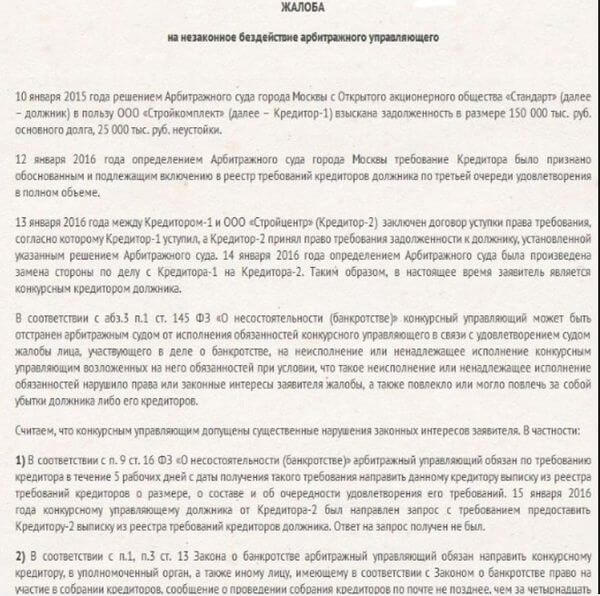
Sample complaint against the bankruptcy trustee
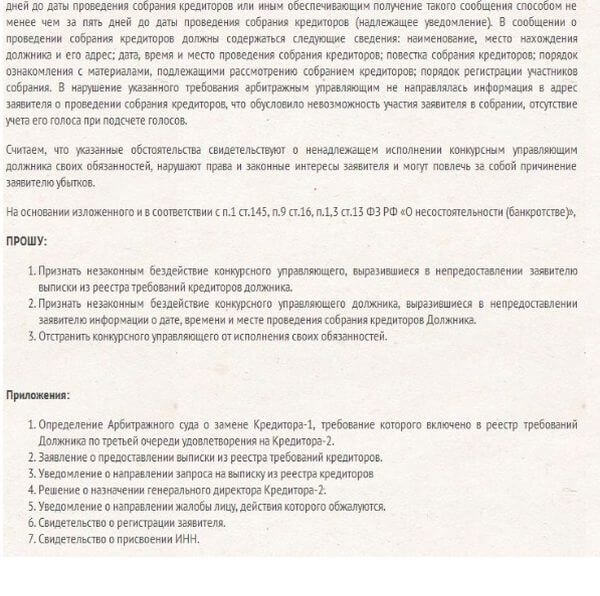
Sample complaint against the bankruptcy trustee
In a number of cases, you should not count on receiving a response or consideration of the submitted complaint. This is relevant when:
- the applicant did not indicate his last name, email or postal address to which the response should be sent;
- the text is written illegibly, it is impossible to read, or the document uses such an order of presentation of facts that it is difficult to understand what the offense is and what the applicant is demanding. In this case, Rosreestr will send him a corresponding notification if the specified postal address and full name of the citizen are legible;
- The court decision is being appealed. Such an appeal is returned to the citizen with an explanation of the procedure for subsequent appeal;
- a question is asked that has already been answered many times, while the complaint does not present new arguments or facts indicating clear violations. In this case, the head or other authorized person of Rosreestr may decide to terminate the correspondence, of which the citizen is notified accordingly;
- if the answer can be given only after the disclosure of state secrets or other information that is protected by federal law.
In addition, Rosreestr may ignore a complaint if it contains offensive or obscene language addressed to specialists, officials and members of their families. The same applies to threats to life, property and health.
Problems with calculating the limitation period in cases involving the recovery of losses from the manager
Another serious problem in collecting damages from the bankruptcy trustee is the calculation of the statute of limitations for subsequent recourse to court. In this case, it is recommended to use the provisions of Part 1 of the Civil Code of the Russian Federation.
In particular, Article 196 indicates that the period for calculating the limitation period is the moment it is established that a specialist has improperly performed the functions assigned to him.
In turn, the defendant has the right to declare the statute of limitations has expired. This right is granted by Article 199 (paragraph 2).
The final verdict remains with the court. Current practice shows that decisions that are directly opposite in meaning are often made. In most cases, not only the time of informing the creditor about the loss, but also the date of its occurrence is taken into account. Typically, such information is received only after the bankruptcy case is completed.
The procedure and problems of determining the moment when the right to file a claim by the creditor arises
The main difficulty in collecting losses from the bankruptcy trustee is the ambiguity of the provisions of Article 20.4 of the Federal Bankruptcy Law. It determines the specialist’s responsibility for the actions he performs.
The key problem is the lack of a clear definition of the moment when a creditor receives the right to go to court. Therefore, some judicial authorities accept claims filed before the end of the bankruptcy procedure. At the same time, other courts allow filing a claim only after the end of the event.
Both approaches are widely used in practice. Moreover, each of them has sufficient legal grounds for use. But the second one seems much more logical and consistent.
It is important to understand that the main illegal action on the part of the arbitration manager is failure to fulfill the obligations assigned to him. These include:
- measures to search, detect and return the debtor’s assets that are at the disposal of third parties;
- ensuring the safety of the debtor's assets;
- collection of debt from third parties who have financial obligations to the debtor.
The latter circumstance is directly regulated by the provisions of Article 129 (clause 2) No. 127-FZ. The manager is charged with fulfilling the duties listed above until the completion of the case on declaring the debtor bankrupt. This follows from the content of two articles of the Federal Law - 147 and 149.
Article 142 is of great importance on the issue under consideration. Its provisions establish the order of satisfaction of creditors’ claims and the procedure for distributing funds received from the sale of the debtor’s property.
An analysis of the above articles of the Federal Bankruptcy Law clearly demonstrates the following fact.
It is extremely difficult to identify the bankruptcy trustee’s abuses or his inaction before the completion of bankruptcy proceedings. How to determine the amount of damage they caused. Therefore, it makes sense to file a lawsuit after the bankruptcy case is over.





